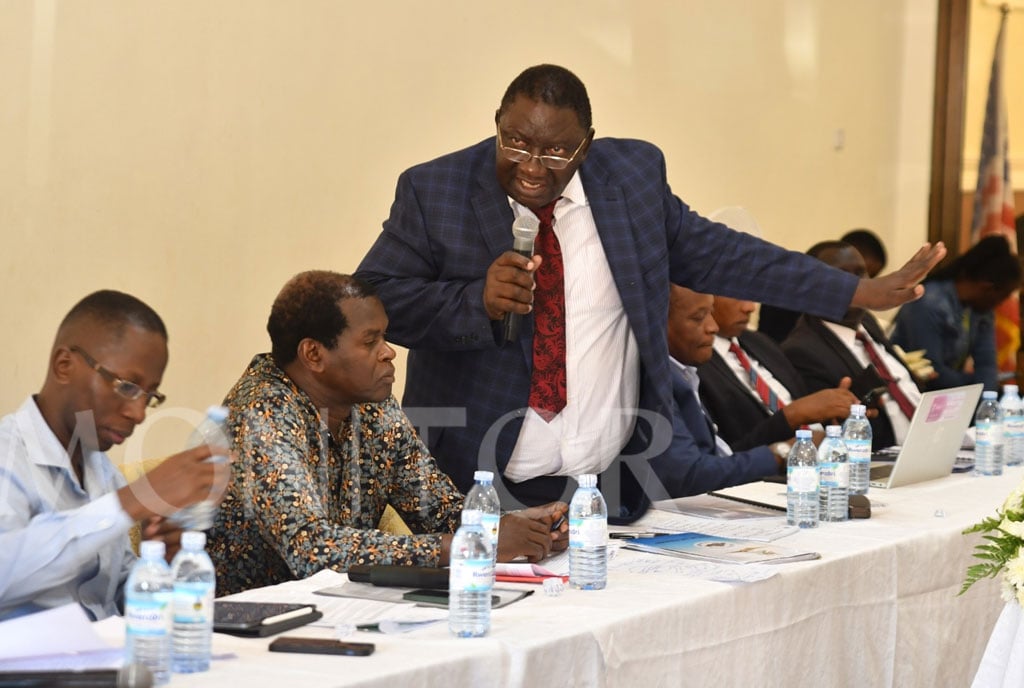NSSF proposes management of National Health Insurance Scheme
The National Social Security Fund (NSSF) has shown interest to collect contributions for the National Health Insurance scheme.
The National Health Insurance Scheme Bill 2019 is meant to introduce a Universal Health Care to improve health outcomes and expand access to essential health care services for all people in need.
The scheme will pool resources where the rich and the healthy will subsidise the treatment for the poor, young and elderly from both formal and informal sector.
While appearing before the Parliamentary committee on health chaired by Michael Bukenya (MP Bukuya County) where the Bill is under scruitiny, NSSF officials led by the Deputy Executive Director Patrick Ayota said they will focus on strengthening the public health care delivery system to ensure that more than 80% of Ugandans living in rural areas have access to good health through equipping existing health structures.
He said that in order to resolve infrastructure inadequacy, a new fund will be set up and earmarked only for establishment, expansion and maintenance of healthcare capital infrastructure
He said when granted the opportunity, they will strengthen the health centre IIIs in the country, and they envision that within three years, over 300 facilities will be fully equipped by the eighth year and all performing to its capacity.
“Even if somebody has already got insurance but how about my mother in the village. It will easier for me to pay for them than shifting them to Kampala,” Ayoya said
NSSF also proposed a reduction of contributions from workers and employers for the proposed National Health Insurance Fund from five to two percent.
The Bill in its current form proposes that workers in the formal sector contribute 4% of their monthly salary to the scheme and an additional 1% be provided by the employer. NSSF is proposing that 1% is contributed by the employee and 1% by the employer to minimize administrative and overhead costs.
NSSF also proposed a minimum usage fee of one percent of the proposed minimum wage from the informal sector which is about Shs130,000 per month.
Asked on the overload with the retirement benefits, Ayota said they are experienced and already have structures.
“We have the experience, we are managing Shs11 trillion today, have we stolen anybody’s money? No, so we have the experience to manage big moneys,” he said.
He said this will focus on financing medical cost on a per-service basis and strengthening the public health care delivery system.
Regarding collection from the informal sector, Ayota told the committee that they would triangulate the database within the National Identity and Registration Authority (NIRA) and the telecom companies that would yield a list of Ugandans and their dependents with the respective National IDs and telephone contacts.
Ayota says the Informal sector workers would contribute through their mobile phones and the charge would vary depending on the number of dependents such a member has.
NSSF proposed a healthcare capital committee composed of Permanent Secretaries of the Ministry of Health, Ministry of Gender, Ministry of Finance, Housing, the Uganda Medical Association and NSSF to operationalize the proposal.
He says any excess funds would be invested by NSSF to meet the administrative overheads, including the operations of the personnel to administer the Fund.
According to NSSF, Ugandans who are currently catered for in other schemes will see their relatives and everyone else not lack health care, be it in the rural areas.
MPs seemingly impresses by the submission, noted that it was a unique model and promised to scrutinize it further.
“It has a workable proposal from their experience of reducing the proposed deduction and they are looking at the implementation level starting from health centre III where the majority of Ugandans should be going, improving the health level,” said MP Bukenya.
“If we put them in this scheme, they are an established system, with a structure that is already in place that is national. As a committee we are going to look at it closely and see how we can get the views from other stakeholders,” he added.




